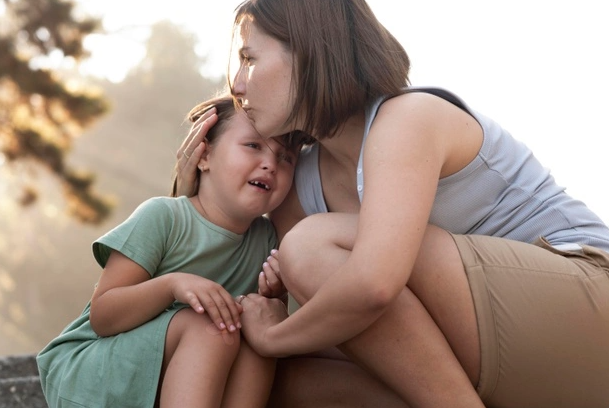This is a common problem among parents that they cannot find a way to deal with their child’s frustration. It can be caused by anything from not getting their way, to not being able to do something as well as they want, or even just the daily stresses of life.
There are many ways that parents can help their children deal with these frustrations in a healthy way. One of the most effective ways is by teaching them how to use their words and express themselves so that they feel less frustrated and more in control of the situation.
We all know that kids are growing up in the digital age. They are constantly exposed to new and exciting experiences, but they also have to deal with the frustration and anger that comes with it.
There are many ways of helping kids defuse their frustrations and anger in the digital age. One way is by using a tool called “Quiet Time.” It’s designed to help kids calm down before they get overwhelmed by their emotions.
Page Contents
Calm Parents Are Better Able to Help Children Handle Frustration
How do you react when your child is frustrated? Does your child’s frustration lead to your own? Imagine you are in a hurry to get out the door and go somewhere and your child is having trouble getting ready or your child is unwilling to leave. How do you feel? Are you emotionally disturbed?
How do you react to your child who keeps saying “I don’t know”? After spending 20 minutes helping her with a number of math problems? A new research study sheds light on how parents’ emotional states affect their children’s emotional wellbeing.
A research team at the UC Riverside School of Psychology conducted an experimental study in which school-age children and their parents faced frustrating challenges together and frustrated themselves when the parents were calm. I’ve found that it can help me adapt. An upcoming study, Physiological Transmission in Diasporas Between Parents and Children While Emotional Challenge, used ECG monitoring between parents and children to measure emotional state. Emotional transmission occurs when the child unwittingly senses their parents’ emotions.
For the investigation, each parent-child pair entered a room that was given a challenging Lego puzzle to complete the child and the parents were ordered to see the child but not help. Later in the session, the couple told me it would take another 5 minutes to solve the puzzle and my parents helped me.
The EKG data showed that the parents’ emotional state affected the child’s emotional regulation, but the child’s emotional state did not. This is a new approach to exploring this aspect of the parent-child relationship, and more research is needed to examine and better understand this phenomenon, but how the parental nervous system works like that of the child. It is useful to see if it is related to the nervous system. This is sometimes called harmonization or co-regulation.
In the second phase, the parent’s connection with the child enabled the child to adjust emotionally and “calm down”. From day one, the way you as a parent react to your child when your child is upset will determine your child’s ability to adapt to themselves.
If a parent tells a crying child to “stop crying,” “get over it,” or be “no big deal,” the child may still be upset. Shouting at a child or telling them to come into the room until they have calmed down does not help self-adjusting or “controlling” their emotions, usually in repetitive and even frustrating situations, leading to an escalation of overreactions leads.
If you pick up your baby while crying, he’ll stop crying when he sees or hears his parents. The child can calm down by hugging and empathizing, and by giving them a sense of security when they are excited. For older children, you can encourage them to use words to express their feelings.
Repeatedly ignoring a child, reacting negatively, or punishing a child when the parents are emotionally troubled leads to the fact that the child reacts more frequently and violently to frustrating situations as they get older. When faced with a crying baby or an upset child, the first thing to do is reorganize the group and keep calm.
A few deep breaths will help most people. Being calm or neutral can help your child regain composure and calm their nervous system without them even knowing. Your baby will be comfortable. Then use this moment to help older children learn skills like deep breathing, reframing (more positive outlook on the situation), and using words to convey their thoughts and feelings.
Parents can assume that their child would rather scream, scream, or step on their feet than use words. Most likely, the child did not develop the correct emotional vocabulary. Breakdown may be the best time to teach your child how to properly describe their feelings.
When your child tells you how they feel and why they feel that way, they can learn to solve problems and accept the situation even if they want to change it. The more time parents spend helping their children develop coping strategies, the less time they spend responding to emotional outbursts. This can help them communicate their needs to others. It also gives your child the opportunity to adjust to the needs of others.
How to deal with child frustration
The best way to calm down your kids is by using a step by step process. It helps them think about what they can do to help themselves feel better.
Step 1: Make sure that you are in a place where you are not angry or frustrated. For example, if you are in the car, then make sure that the kids can’t see your facial expression and that they don’t hear anything else going on around them.
Step 2: Try to make eye contact with your child, even if it’s just for a few seconds. This will help them know that you’re paying attention and want to help them calm down.
Step 3: If your child is still upset, then try to find something funny about the situation and say something like “Haha! I’m so glad we’re all safe.” This will help break the tension of the situation and show that you’re still there for them.
Do share your ideas through comments or directly write to us about Calm Parents Are Better Able to Help Children Handle Frustration.

Lois Lane is a professional blogger and a seasoned Content writer for wellhousekeeping.com. With a passion for simplifying complex Home Decor topics, he provides valuable insights to a diverse online audience. With four years of experience, Lois has polished his skills as a professional blogger.




